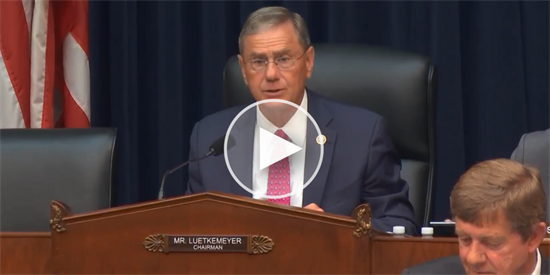Press Releases
Luetkemeyer Delivers Opening Statement on the Implications of De-Risking
Washington,
June 26, 2018
Congressman Blaine Luetkemeyer (MO-03), Chairman of the Subcommittee on Financial Institutions and Consumer Credit, delivered the following opening statement at a hearing entitled “International and Domestic Implications of De-Risking:”
This Subcommittee has spent significant time analyzing the impact of de-risking on consumers, businesses, and entire communities. As we’ve discussed, the overly-punitive supervisory and examination tactics employed by federal financial regulators, that came in the wake of the financial crisis, have had dramatic implications on the availability of financial products and services in all of our communities. What we’ve not discussed are the global implications of these regulations. Today, we will not only explore de-risking’s impact on U.S. financial institutions and their customers, but also its impact on people and businesses around the world, as well as our fight to combat illicit financial activity. Banking relationships with so-called “high risk” clients have become cost-prohibitive for financial institutions, due in large part to heightened compliance expectations. As a result, many institutions have opted to terminate relationships. This decision has resulted in the elimination of consumer and small business access to financial products and services, a decrease in the availability of money remittances, and reduced flow of humanitarian aid globally. To be clear, there are valid reasons for account terminations, and the fight against illicit finance is one of the most important fights we wage. However, we would be better equipped to wage that fight if we had a modernized regulatory system. That’s particularly true in the case of compliance with the Bank Secrecy Act and anti-money laundering laws. The truth of the matter is that compliance with BSA/AML is so costly, and the penalties so steep, financial institutions would soon rather end customer relationships than run the risk of running afoul of their regulators and law enforcement. The status quo doesn’t foster a safer system, and it doesn’t necessarily help catch more bad actors. In fact, it’s quite the opposite. Instead of fostering collaborative relationships between institutions and government, the modern BSA/AML framework, along with the other regulatory drivers of de-risking, push more people and more money into the shadows. So where do some of those de-banked customers go? According to data published last year by payment and compliance technology company Accuity, correspondent banking relationships with Chinese banks surged more than 3,300 percent – from 65 in 2009 to 2,246 in 2016. There was a 25 percent drop in the number of correspondent banking relationships globally during the same time period. It is in the best interest of our financial services firms, our communities, law enforcement, and the federal government to monitor and maintain these global banking relationships. This hearing isn’t only important to the people testifying today, or to the financial institutions that do business internationally. It’s important to any small nation that relies heavily on the U.S. dollar, and the trading partners who sell U.S. goods there. It’s important to border communities that are losing banks and credit unions because of the BSA/AML regime. It’s important to a worker in Florida who can no longer send the money he earns to help his family in Haiti. This is an incredibly important topic. We have an excellent panel today, and I want to thank each of them for taking the time to testify. We look forward to your statements. ### |

